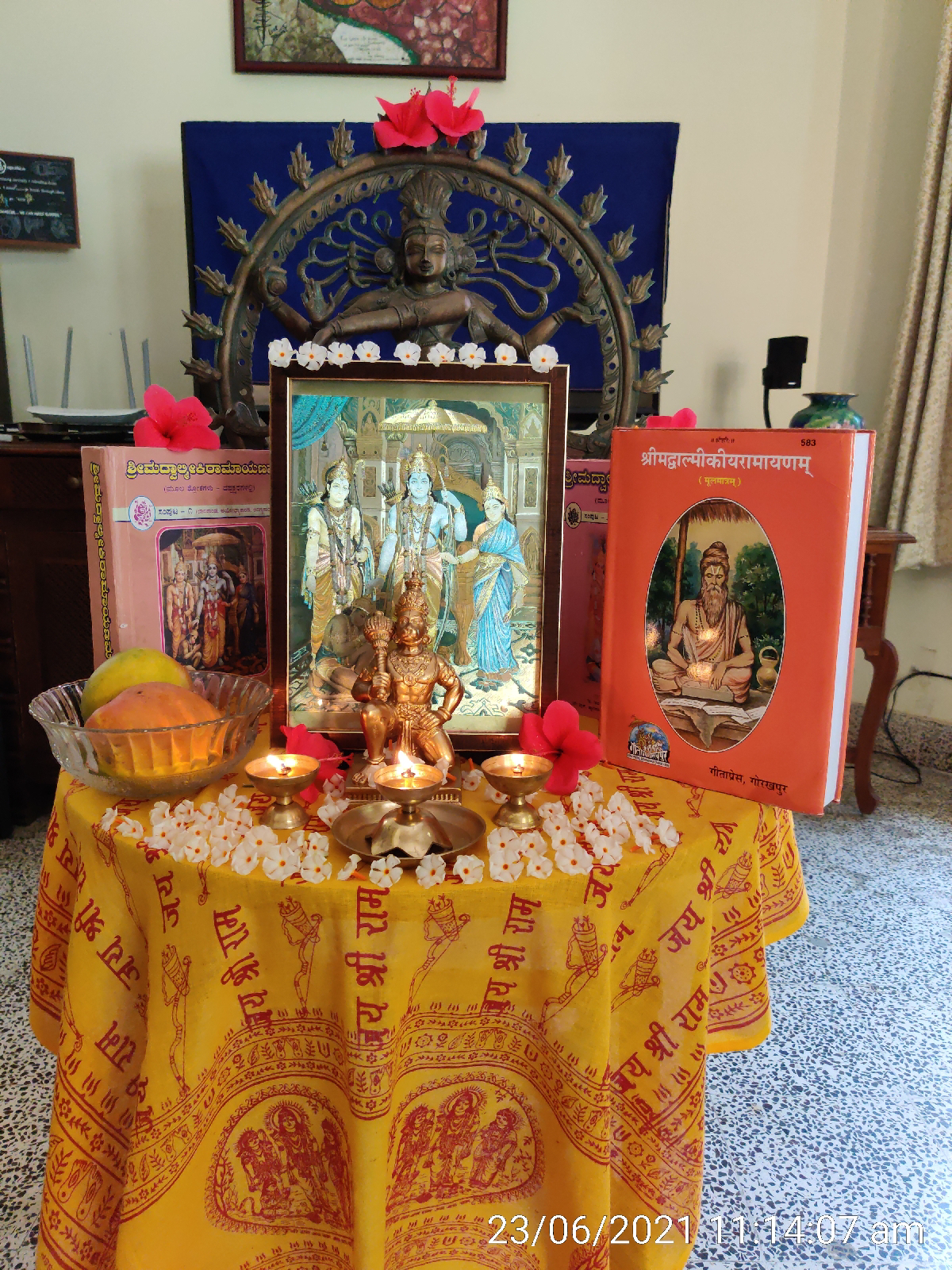June 30 - Sargas 65 and 66 of Ayodhya Kanda.
Already half of 2021 is done and dusted, and Covid is nowhere near being tamed. As the days roll by, we engage ourselves as best as we can, and what better activity can one find than reading the Valmiki epic!?
Before I tell you what we read today, let us recall who Valmiki is. He was Ratnakara, a dacoit. His reputation for ruthlessness did not deter Narada from going into the forest and coming to be accosted by him. Trust Narada to instil sense in the man who quickly mended his old ways of breaking people's skulls for their money. Vamiki instead began his search for abiding riches hidden in one's soul.
Fast forward to the beginning of Valmiki Ramayana, When sage Valmiki asks Narada maharshi if there ever was or is an ideal man on earth who breathes and lives Dharma, Narada tells him the story of such a man, Rama.
The beginning of Valimiki's poem is strange. Valmiki goes for his bath in the river and bursts into rhyme at the sight of a hunter killing a bird. He realises to his astonishment there is poetry in the words that came out of him in anger and sorrow. Then Brahma tells him it is divine will that Valmiki should put his newly discovered gift for poetry to tell the world the story of Rama. Thus is born the world's first shloka (a poem with four padas in a metre) from the sadness expressed by the sage at the killing of the bird (shoka).
Valmiki then uses his spiritual power to visualise the entire story of Ramayana and writes down the kavya.
Did Valmiki ever live in cities? See royal ceremonies? Interact with a wide spectrum of people to understand their ways and ideas and idiom? So how come we have this fantastic narrative?
Do we need any more proof that Valmiki Ramayana is a divine inspiration and not a laboured poem?
***
We are already privy to the fact that Dasharatha is dead. But it seems no one in Ayodhya knows it next morning.
***
As usual, panegyrists expert in singing the glories of their kings, their dynasties and conquests, and stories to inspire society, assembled at Dasharatha's palace. They sang musically, being mindful of the subtle tones of the Veena. Their loud and attractive chants were joined in by others who clapped and sang, perhaps in a more common style. The birds on trees and in royal cages joined with their chirping. Thus there was a celebratory welcome to the morning, a ceremony designed to wake up Dasharatha.
Attendants came to give the king his royal bath with unguents and perfumes. They carried golden pitchers of water. Prasada (holy offerings) and water from holy rivers and springs, and other items for the king's partaking, were brought. His dress and other accessories were carried in.
As the entire entourage waited, even after sunrise, there was no sign of the king. Murmurs started that it was unusual for the king not to have risen. Hordes of Dasharatha's women then went into his sleeping chamber. The king lay between Kausalya and Sumitra. It seemed they were all exhausted and too deep in sleep. His other queens began to call him and touch him but finding no response they closely examined why the king was not stirring. They discovered to their horror that there was neither breath nor pulse.
The women started wailing. That woke up Kausalya and Sumitra. It did not take long for them to realise that the king had passed away. Kausalya fell to the floor wailing, like a fallen star. The noises brought everyone to the chamber including Kaikeyi.
There was a huge uproar of wailing.
***
स कामा भव कैकेयि भुङ्क्ष्व राज्यमकण्टकम् ।
त्यक्त्वा राजानामेकाग्रा नृशंसे दुष्टचारिणि ॥
न लुब्धो बुध्यते दोषान् किंपाकमिव भक्षयन् ।
कुब्जानिमित्तं कैकेय्या राघवाणां कुलं हतम् ॥
अनियोगे नियुक्तेन राज्ञा रामं विवासितम् ।
सभार्यं जनकः श्रुत्वा परितप्स्यत्यहं यथा ॥
स मामनाथां विधवां नाद्य जानाति राघवः ।
रामः कमलपत्रताक्षो जीवन्नाशमितो गतः ॥
Kausalya's life breath has only one purpose now. To speak to Kaikeyi.
"Oh Kaikeyi, you of most vile deeds, now rejoice at having won your desire. You have single-mindedly got rid of the king. Now enjoy your kingdom unimpeded.
"A greedy man indeed does not realise what harm will befall him when he partakes of some bad but attractive food. Egged on by that hunchback Manthara, Kaikeyi has destroyed the dynasty of Raghus.
"When he comes to know that Kaikeyi has managed to get Rama banished to the forest with his wife Sita by the king, king Janaka will suffer as much as I am doing now.
"And to think that the pious Rama, with lotus eyes, who has been taken out of the equation here even though he is still alive, will never come to know that I have been made a widow with no one to care for me! "
And so on.
Some administrators who are around do the practical thing of getting her hand maids to gently escort Kausalya to her chamber, so she can recover her poise.
तैलद्रोण्यां तदाऽमात्याः संवेश्य जगतीपतिम् ।
राज्ञः सर्वाणयथादिष्टाश्चक्रुः कर्मण्यनन्तरम् ॥
The ministers then consulted the wise men what was to be done next. The king's body had to be preserved for last rites until at least one of his sons was present to perform the ceremonies. So they did as directed and prepared a casket of oil and immersed the king's body in it. They did whatever more had to be done to keep the vigil.
The entire Ayodhya was stricken with the tragedy of Dasharatha's death. Valmiki describes the scenes of wailing and the citizens' apprehensions for the future of the city and the kingdom. Ayodhya was like the night sky without stars. Everyone blamed Kaikeyi for the turn of events.
***
॥ श्रीरामजयम् ॥













